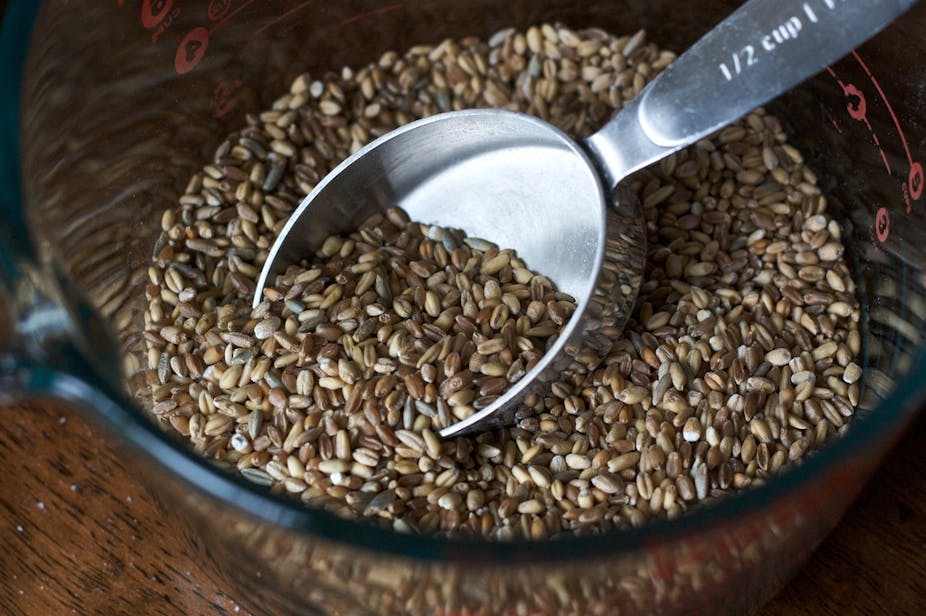Eating whole grain foods, such as oats and grainy breads, is better for health than refined grain foods such as white bread or pizza. But whole grains are also thought to have a role in inflammation.
Whole grains comprise three main parts: germ (the embryo), bran (husk), and endosperm (the part of the seed that’s the food store for the embryo). They have more fibre, vitamins, minerals, antioxidants, and other bioactive compounds than refined grains, which have the germ and bran removed.
These compounds may contribute to how whole grain consumption reduces the risk of developing chronic diseases such as obesity, type-2 diabetes and cancer.
A common factor in these diseases is their underlying inflammation, which contributes to the damage they can cause.
Understanding inflammation
Inflammation is part of the body’s repair process, following an infection or injury.
It’s a short-term process that’s important for healing, with obvious localised symptoms of pain, redness and swelling. But persistent, non-resolving inflammation is a factor in many chronic diseases.
This ongoing, low-grade inflammation can simmer in the background without obvious symptoms, potentially causing widespread damage and dysfunction to tissues and signalling molecules, and causing even more inflammation.
It appears that as body fat increases, so does inflammation – in adults, adolescents, and children.
Some foods are thought to have anti-inflammatory properties. This effect may be related to their role in weight maintenance or the effects of nutrients and bioactive compounds – or both.
Whole grains contain many bioactive compounds including antioxidants and are of particular interest in this regard because they’re a staple food globally. What’s more, their consumption is linked to healthy weight.
What the research says
In a 2010 paper, researchers proposed that there may be a relationship between eating whole grains, refined grains, and levels of inflammation.
They investigated this relationship using data from a large population study conducted in the United States between September 1991 and December 2008. The researchers measured whole grain intake from diet diaries, analysing them against three recognised blood markers of inflammation.
They found that eating more whole grains may be correlated with reducing inflammation – but it wasn’t entirely clear how (it may depend on metabolic factors, such as waist circumference). They also found eating refined grains may worsen inflammation no matter whether a person is overweight or normal weight.
What’s more, as the study used diet diaries to estimate whole grain intake, it’s unclear whether the observed effects relate to diets that include whole grains, or the effects of the grains alone – or, indeed, to lifestyle factors.
Each more complex
The idea that grain foods may affect inflammation has also been investigated in other studies. One found that diets including whole grains were associated with lower levels of inflammatory markers in a large multi-ethnic population study.
Similarly, a smaller study in premenopausal women concluded that eating a serving of whole grains every day led to 12.3% lower inflammation.
But no association between whole grain intake and inflammation was found in an analysis of two large population studies, although researchers found other health benefits, such as reducing diabetes and heart disease risks.
Yet another study in overweight adults also found no difference between refined and whole grain diets on inflammation markers after participants adhered to one or the other diet for six weeks.
Some researchers have even proposed that grains such as wheat may actually be pro-inflammatory, directly contributing to inflammation through allergens like gluten, which may reduce the function of the gut barrier and cause immune and inflammatory responses.
Still muddy
The relationship between whole grain intake and inflammation is still not entirely clear. And whether any effects of whole grains on inflammation are due to the grains themselves, independently of other factors, remains to be seen.
The contrasting results between the many studies cited above may be due to the many variations between them, including whether indirect or direct effects are being measured; grain types, quantities consumed, and length of time that grains are used; the type of population being studied; and degree of control for other dietary factors.
And indeed, any observed effect on inflammation relating to eating whole grains may be the effect of the whole grain food itself, single components within the food, whether people who eat more whole grain foods have healthier lifestyles overall, or a combination of these factors.
Nevertheless, replacing refined grains with whole grains has many other health benefits, and it’s probably a wise move for most of us.

